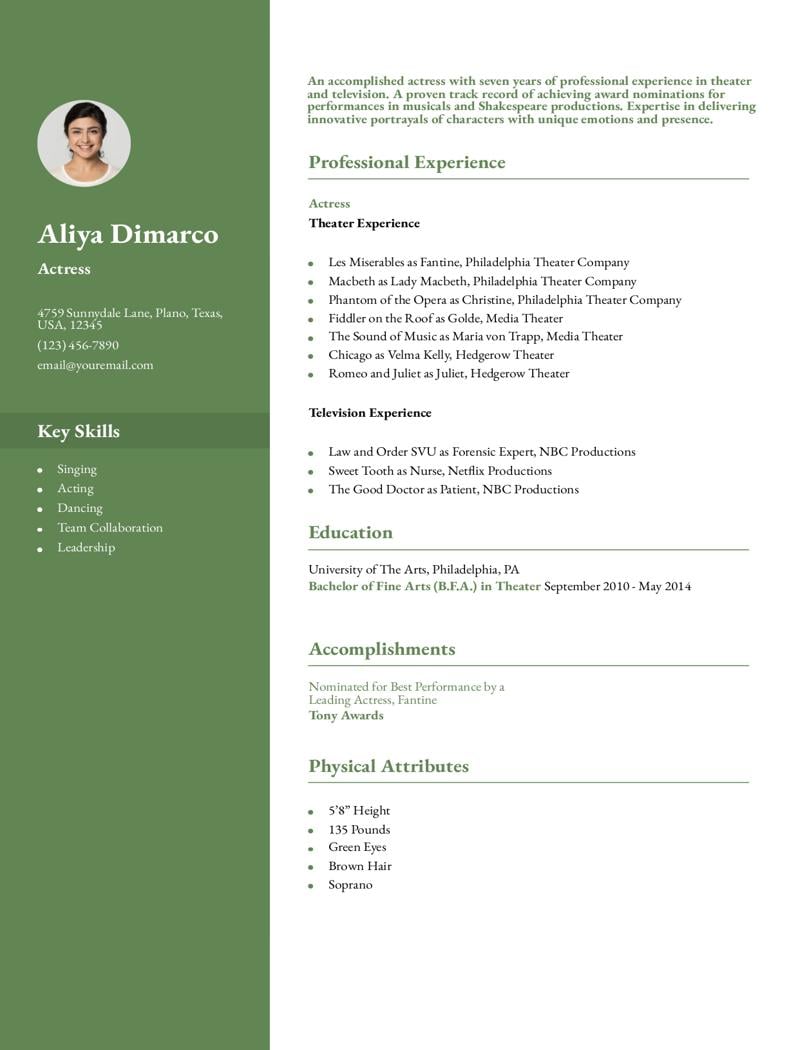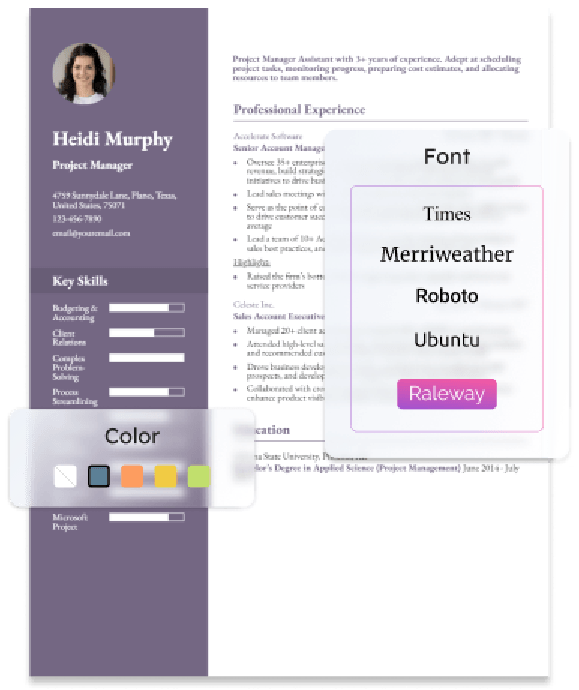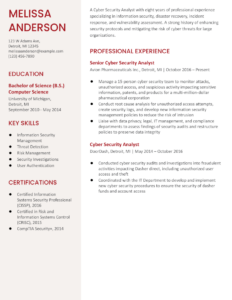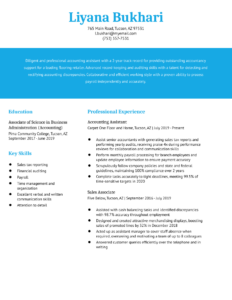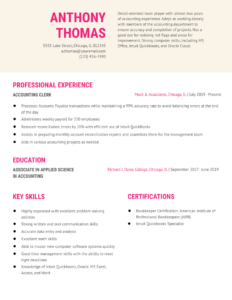How To Write a Theater Resume
Theater resumes follow a distinct structure that makes them unique from other ones. It’s best to consider your theater resume an extension of your professional portfolio. The goal is to create a comprehensive marketing document that showcases your strongest performances and acting experience. Theater auditions are highly competitive, and you must display your accomplishments to stand out from other applicants. We’ll provide expert tips to help you translate your career experience into an accomplishment-driven theater resume.
- Entry-Level
- Mid-Career
- Senior-Level
1. Create a profile by summarizing your theater qualifications
To grab the attention of casting directors, craft a strong opening summary highlighting the most powerful aspects of your acting career. For example, you may want to provide some examples of your most prominent roles. You could also emphasize any significant awards or nominations you achieved. Below your profile, provide key physical attributes and your vocal range.
Professional Profile - Example #1
Profile
An accomplished actress with seven years of professional experience in theater and television. A proven track record of achieving award nominations for performances in both musicals and Shakespeare productions. Expertise in delivering innovative portrayals of characters with unique emotions and presence.
Physical Attributes
- 5 feet 8 inches height
- 135 pounds
- Brown hair
- Green eyes
- Soprano
Professional Profile - Example #2
Profile
An award-winning theater actor with 10 years of experience in film, musical theater, and television. Achieved recognition for a featured role in the Broadway production of “Hamilton.” An active Screen Actors Guild (SAG) and Actors’ Equity Association member.
Physical Attributes
- 5 feet 11 inches height
- 175 pounds
- Blue eyes
- Brown hair
- Tenor
2. Create a powerful list of your theater experience
Unlike traditional resumes, theater resumes don’t require bullet points in most instances. Instead, compile a list of your acting performances. Be sure to specify the character, theater organization, and date. You can also consider including the director of the play on your resume.
Theater circles are often smaller than one might think, and familiarity with a previous director might increase your chances of landing an audition.
Professional Experience - Example #1
Theater experience
Film & television experience
Professional Experience - Example #2
Theater experience
3. Include your theater education and certifications
In addition to your education, highlight any awards or nominations you’ve received throughout your acting career. Tony awards, in particular, carry the most weight amongst the theater community. If you’re a member of a prominent association, such as SAG, create an additional section to showcase these memberships.
Education
Template
- [Degree Name]
- [School Name], [City, State Abbreviation] [Dates Enrolled]
Example
- Bachelor of Fine Arts (B.F.A.) Theater
- American Academy of Dramatic Arts, New York, NY September 2007 – May 2011
Awards
Template
- [Award Name], [Awarding Organization], [Completion Year]
Example
- Best Performance by a Featured Actor, Fantine, Aaron Burr, Tony Awards
- Nominated for Best Performance by a Featured Actor, Javert, Tony Awards
4. List your key theater skills and proficiencies
Theater resumes differ from other industries in that production companies rarely use Applicant Tracking Software (ATS) to identify candidates for auditions. In most cases, your portfolio will be reviewed by the director or production studio to evaluate your experience and performance. Although ATS systems won’t screen you, include key skills from the job posting to showcase your qualifications and areas of expertise for the director. Below, you’ll find a list of key skills you may encounter as you pursue auditions:
| Key Skills and Proficiencies | |
|---|---|
| Acting | Alto |
| Baritone | Body language |
| Character acting | Contralto |
| Countertenor | Dancing |
| Drama | Facial expressions |
| Leadership | Method acting |
| Mezzo-soprano | Musical acting |
| Musical theater | Singing |
| Soprano | Tap dancing |
| Team collaboration | Tenor |
How To Pick the Best Theater Resume Template
When selecting your theater resume template, the best option is to focus on structure and organization over visual appeal. Casting directors are primarily interested in your previous roles and awards, so avoid using flashy colors and graphics that might distract the reader from your content. Using a template that allows for a professional headshot is acceptable, but you can also provide this as a separate attachment.
Theater Text-Only Resume Templates and Examples
- Example #1
- Example #2
- Example #3
Sarah Geller
(123) 456-7890
[email protected]
123 Your Street, New York, NY 12345
Profile
A dynamic actress with eight years of experience delivering award-worthy performances in a wide variety of Broadway productions. Expertise in utilizing a method acting approach to adopt authentic character personas. Achieved recognition for leading roles in the Wizard of Oz, Moulin Rouge! and Rent.
Physical Attributes
- 5’7” Height
- 129 Pounds
- Hazel Eyes
- Brunette Hair
- Soprano
Theater Experience
Television Experience
Awards
- Best Performance by a Leading Actress, Satine, Tony Awards
- Nominated for Best Performance by a Featured Actress, Maureen, Tony Awards
Associations
- Screen Actors Guild (SAG), Member, 2013 – Present
Education
Bachelor of Fine Arts (B.F.A.) Theater
Columbia University, New York, NY September 2009 – May 2013
Key Skills
- Soprano Vocal Range
- Singing
- Method Acting
- Dancing
- Acrobatics
Frequently Asked Questions: Theater Resume Examples and Advice
How do you align your resume with a job description?-
The median income for theater actors was $46,960 in 2021, according to the Bureau of Labor Statistics. This industry is projected to grow by 8% over the next 10 years, much higher than average. Competition for roles in prominent theater productions will always be high, and tailoring your resume toward individual casting calls can give you an advantage.
For example, if you’re seeking an audition in a Shakespeare production, make a point to highlight your previous roles in his plays. If you’re pursuing a musical theater role that requires an advanced understanding of choreography, feature these details in your opening summary. By aligning your resume with the casting call, you’ll significantly increase your chances of landing the interview.
What is the best theater resume format?-
Reverse chronological is the ideal format for theater resumes. This ensures your most recent roles and performances are featured at the top of your document for casting directors. A functional resume format isn’t the best choice, even if you’re trying to break into the industry. In this instance, you’d still be better off highlighting your acting experience from college and high school rather than prioritizing skill sets.
Craft your perfect resume in minutes
Get 2x more interviews with Resume Builder. Access Pro Plan features for a limited time!

Sending a matching cover letter to talent agents and casting directors can be a helpful tool in securing auditions. This allows you to highlight your unique approach to acting, your passion for your craft, and who you are as a professional. If you write a cover letter, tailor it to individual auditions and directors. For more insights, visit our acting cover letter guide.
